Professional Ethics in the Workplace: M&Co. Report and Analysis
VerifiedAdded on 2020/12/09
|14
|4483
|438
Report
AI Summary
This report, centered around the hypothetical company M&Co., delves into the multifaceted realm of professional ethics within the finance sector. It commences by outlining the fundamental principles of ethical behavior, such as integrity, objectivity, and confidentiality, while also detailing relevant legal, regulatory, and ethical requirements that impact accounting and finance. The report emphasizes the roles of professional bodies in upholding ethical standards and explains why individuals, organizations, and the industry are expected to adhere to codes of conduct. It explores the risks associated with improper practices and the importance of vigilance. The report also covers maintaining up-to-date knowledge of changes in codes of practice. Further, the report analyzes ethical conduct with clients, suppliers, and colleagues, highlighting the significance of objectivity, professional distance, and adherence to organizational values. It also examines situations involving confidential information, working within professional limitations, reporting unethical behavior, and strategies for preventing ethical conflicts. The report concludes by emphasizing the importance of an ethical approach to sustainability and the responsibilities of finance professionals in upholding these principles.
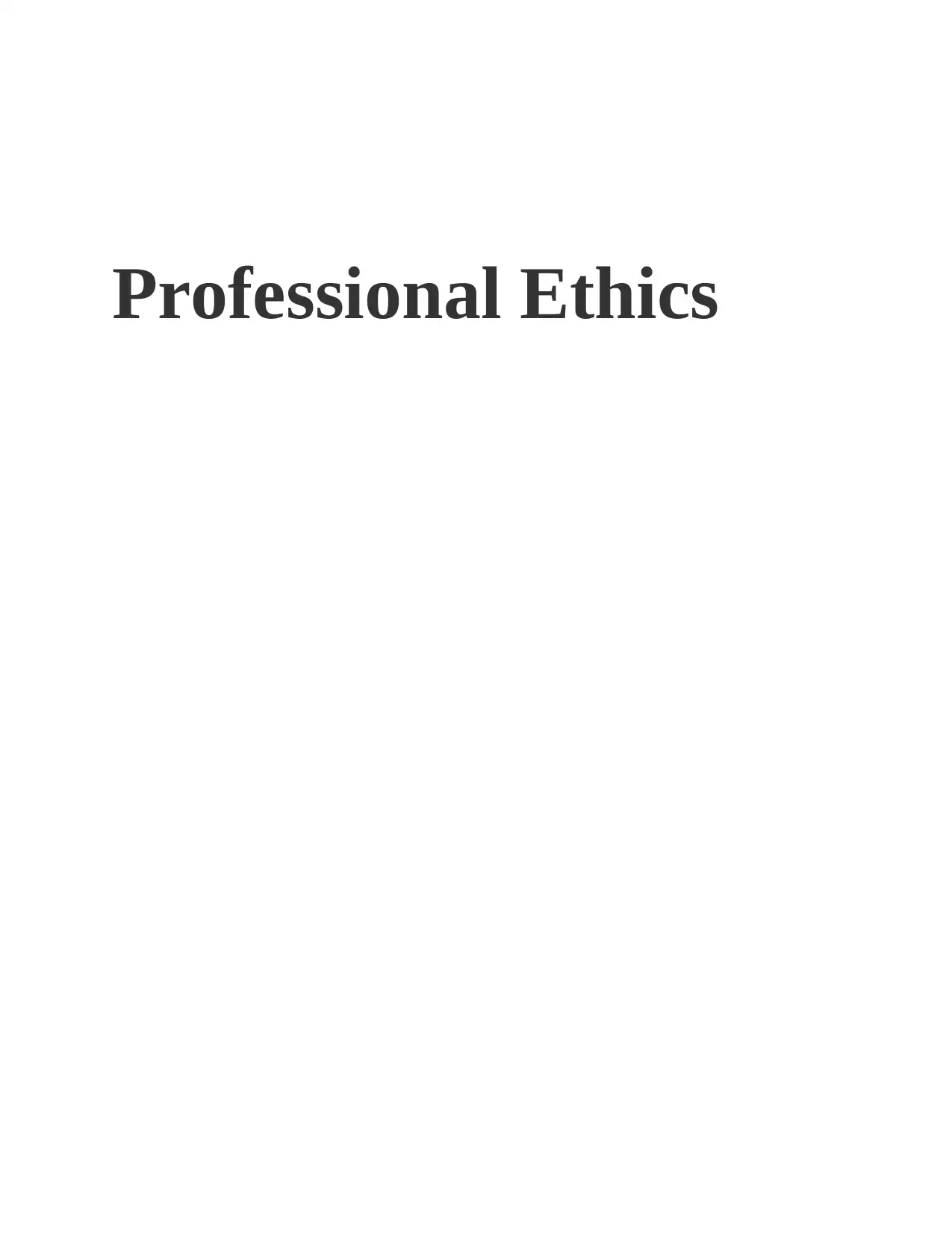
Professional Ethics
Paraphrase This Document
Need a fresh take? Get an instant paraphrase of this document with our AI Paraphraser
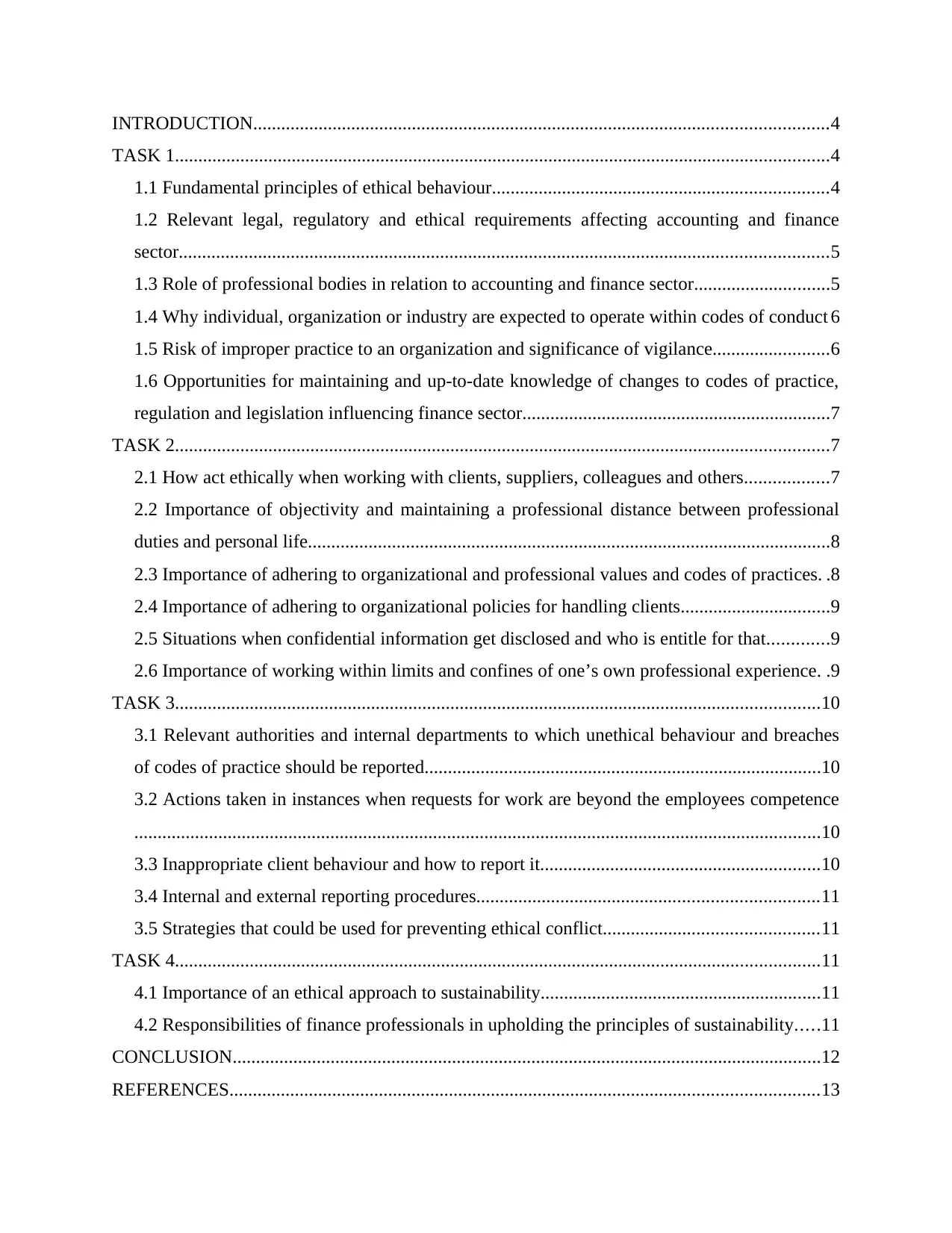
INTRODUCTION...........................................................................................................................4
TASK 1............................................................................................................................................4
1.1 Fundamental principles of ethical behaviour........................................................................4
1.2 Relevant legal, regulatory and ethical requirements affecting accounting and finance
sector...........................................................................................................................................5
1.3 Role of professional bodies in relation to accounting and finance sector.............................5
1.4 Why individual, organization or industry are expected to operate within codes of conduct 6
1.5 Risk of improper practice to an organization and significance of vigilance.........................6
1.6 Opportunities for maintaining and up-to-date knowledge of changes to codes of practice,
regulation and legislation influencing finance sector..................................................................7
TASK 2............................................................................................................................................7
2.1 How act ethically when working with clients, suppliers, colleagues and others..................7
2.2 Importance of objectivity and maintaining a professional distance between professional
duties and personal life................................................................................................................8
2.3 Importance of adhering to organizational and professional values and codes of practices. .8
2.4 Importance of adhering to organizational policies for handling clients................................9
2.5 Situations when confidential information get disclosed and who is entitle for that.............9
2.6 Importance of working within limits and confines of one’s own professional experience. .9
TASK 3..........................................................................................................................................10
3.1 Relevant authorities and internal departments to which unethical behaviour and breaches
of codes of practice should be reported.....................................................................................10
3.2 Actions taken in instances when requests for work are beyond the employees competence
...................................................................................................................................................10
3.3 Inappropriate client behaviour and how to report it............................................................10
3.4 Internal and external reporting procedures.........................................................................11
3.5 Strategies that could be used for preventing ethical conflict..............................................11
TASK 4..........................................................................................................................................11
4.1 Importance of an ethical approach to sustainability............................................................11
4.2 Responsibilities of finance professionals in upholding the principles of sustainability.....11
CONCLUSION..............................................................................................................................12
REFERENCES..............................................................................................................................13
TASK 1............................................................................................................................................4
1.1 Fundamental principles of ethical behaviour........................................................................4
1.2 Relevant legal, regulatory and ethical requirements affecting accounting and finance
sector...........................................................................................................................................5
1.3 Role of professional bodies in relation to accounting and finance sector.............................5
1.4 Why individual, organization or industry are expected to operate within codes of conduct 6
1.5 Risk of improper practice to an organization and significance of vigilance.........................6
1.6 Opportunities for maintaining and up-to-date knowledge of changes to codes of practice,
regulation and legislation influencing finance sector..................................................................7
TASK 2............................................................................................................................................7
2.1 How act ethically when working with clients, suppliers, colleagues and others..................7
2.2 Importance of objectivity and maintaining a professional distance between professional
duties and personal life................................................................................................................8
2.3 Importance of adhering to organizational and professional values and codes of practices. .8
2.4 Importance of adhering to organizational policies for handling clients................................9
2.5 Situations when confidential information get disclosed and who is entitle for that.............9
2.6 Importance of working within limits and confines of one’s own professional experience. .9
TASK 3..........................................................................................................................................10
3.1 Relevant authorities and internal departments to which unethical behaviour and breaches
of codes of practice should be reported.....................................................................................10
3.2 Actions taken in instances when requests for work are beyond the employees competence
...................................................................................................................................................10
3.3 Inappropriate client behaviour and how to report it............................................................10
3.4 Internal and external reporting procedures.........................................................................11
3.5 Strategies that could be used for preventing ethical conflict..............................................11
TASK 4..........................................................................................................................................11
4.1 Importance of an ethical approach to sustainability............................................................11
4.2 Responsibilities of finance professionals in upholding the principles of sustainability.....11
CONCLUSION..............................................................................................................................12
REFERENCES..............................................................................................................................13
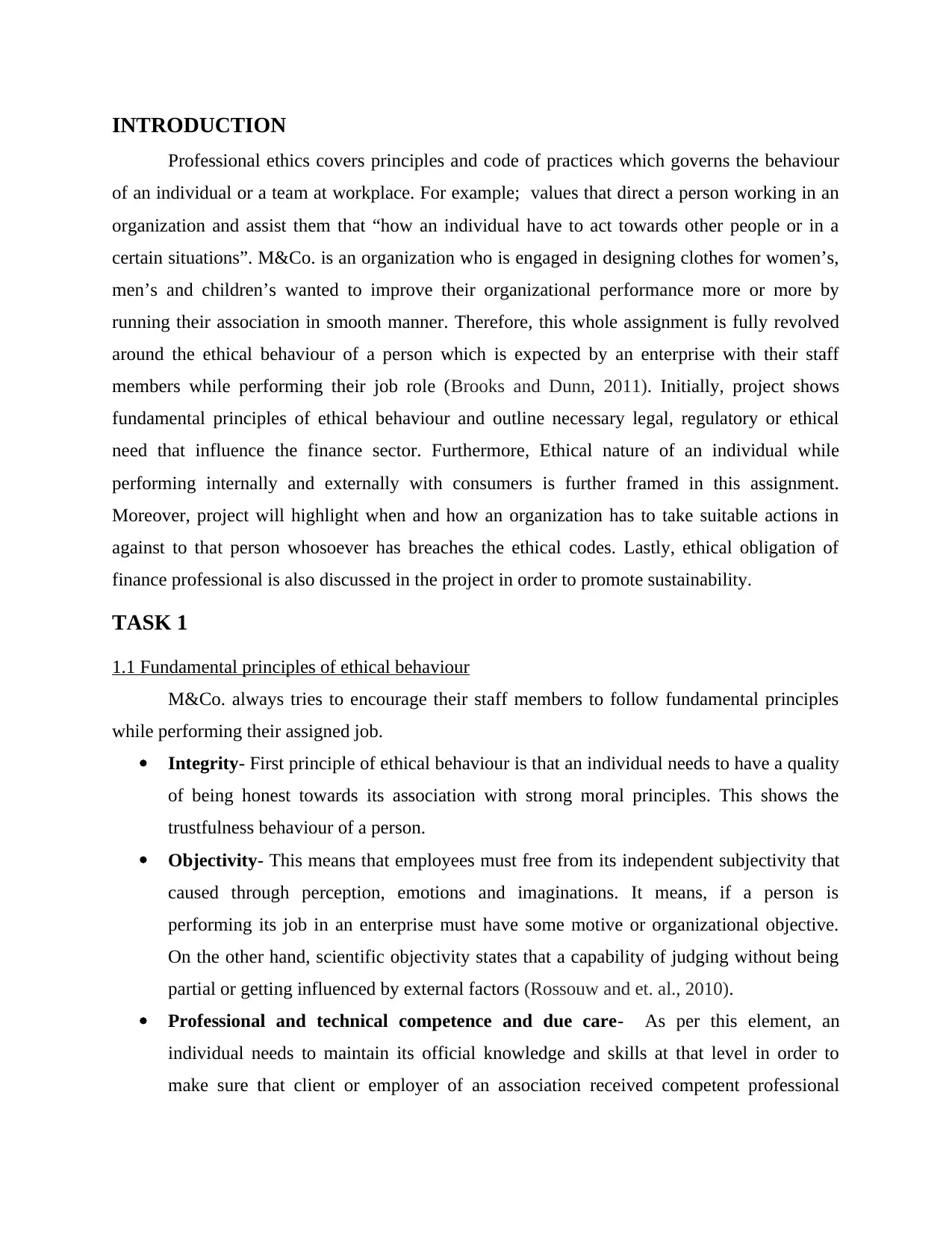
INTRODUCTION
Professional ethics covers principles and code of practices which governs the behaviour
of an individual or a team at workplace. For example; values that direct a person working in an
organization and assist them that “how an individual have to act towards other people or in a
certain situations”. M&Co. is an organization who is engaged in designing clothes for women’s,
men’s and children’s wanted to improve their organizational performance more or more by
running their association in smooth manner. Therefore, this whole assignment is fully revolved
around the ethical behaviour of a person which is expected by an enterprise with their staff
members while performing their job role (Brooks and Dunn, 2011). Initially, project shows
fundamental principles of ethical behaviour and outline necessary legal, regulatory or ethical
need that influence the finance sector. Furthermore, Ethical nature of an individual while
performing internally and externally with consumers is further framed in this assignment.
Moreover, project will highlight when and how an organization has to take suitable actions in
against to that person whosoever has breaches the ethical codes. Lastly, ethical obligation of
finance professional is also discussed in the project in order to promote sustainability.
TASK 1
1.1 Fundamental principles of ethical behaviour
M&Co. always tries to encourage their staff members to follow fundamental principles
while performing their assigned job.
Integrity- First principle of ethical behaviour is that an individual needs to have a quality
of being honest towards its association with strong moral principles. This shows the
trustfulness behaviour of a person.
Objectivity- This means that employees must free from its independent subjectivity that
caused through perception, emotions and imaginations. It means, if a person is
performing its job in an enterprise must have some motive or organizational objective.
On the other hand, scientific objectivity states that a capability of judging without being
partial or getting influenced by external factors (Rossouw and et. al., 2010).
Professional and technical competence and due care- As per this element, an
individual needs to maintain its official knowledge and skills at that level in order to
make sure that client or employer of an association received competent professional
Professional ethics covers principles and code of practices which governs the behaviour
of an individual or a team at workplace. For example; values that direct a person working in an
organization and assist them that “how an individual have to act towards other people or in a
certain situations”. M&Co. is an organization who is engaged in designing clothes for women’s,
men’s and children’s wanted to improve their organizational performance more or more by
running their association in smooth manner. Therefore, this whole assignment is fully revolved
around the ethical behaviour of a person which is expected by an enterprise with their staff
members while performing their job role (Brooks and Dunn, 2011). Initially, project shows
fundamental principles of ethical behaviour and outline necessary legal, regulatory or ethical
need that influence the finance sector. Furthermore, Ethical nature of an individual while
performing internally and externally with consumers is further framed in this assignment.
Moreover, project will highlight when and how an organization has to take suitable actions in
against to that person whosoever has breaches the ethical codes. Lastly, ethical obligation of
finance professional is also discussed in the project in order to promote sustainability.
TASK 1
1.1 Fundamental principles of ethical behaviour
M&Co. always tries to encourage their staff members to follow fundamental principles
while performing their assigned job.
Integrity- First principle of ethical behaviour is that an individual needs to have a quality
of being honest towards its association with strong moral principles. This shows the
trustfulness behaviour of a person.
Objectivity- This means that employees must free from its independent subjectivity that
caused through perception, emotions and imaginations. It means, if a person is
performing its job in an enterprise must have some motive or organizational objective.
On the other hand, scientific objectivity states that a capability of judging without being
partial or getting influenced by external factors (Rossouw and et. al., 2010).
Professional and technical competence and due care- As per this element, an
individual needs to maintain its official knowledge and skills at that level in order to
make sure that client or employer of an association received competent professional
⊘ This is a preview!⊘
Do you want full access?
Subscribe today to unlock all pages.

Trusted by 1+ million students worldwide
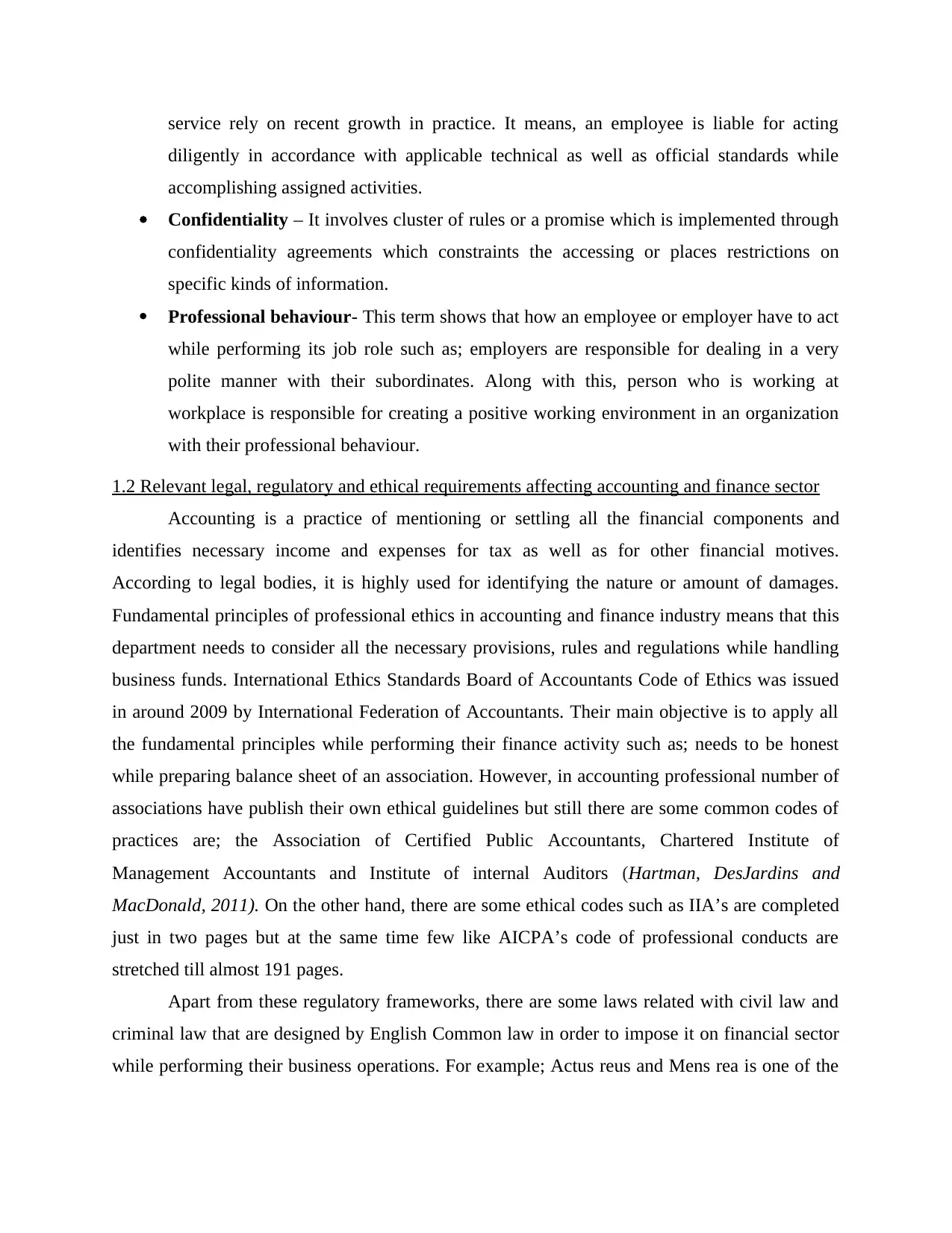
service rely on recent growth in practice. It means, an employee is liable for acting
diligently in accordance with applicable technical as well as official standards while
accomplishing assigned activities.
Confidentiality – It involves cluster of rules or a promise which is implemented through
confidentiality agreements which constraints the accessing or places restrictions on
specific kinds of information.
Professional behaviour- This term shows that how an employee or employer have to act
while performing its job role such as; employers are responsible for dealing in a very
polite manner with their subordinates. Along with this, person who is working at
workplace is responsible for creating a positive working environment in an organization
with their professional behaviour.
1.2 Relevant legal, regulatory and ethical requirements affecting accounting and finance sector
Accounting is a practice of mentioning or settling all the financial components and
identifies necessary income and expenses for tax as well as for other financial motives.
According to legal bodies, it is highly used for identifying the nature or amount of damages.
Fundamental principles of professional ethics in accounting and finance industry means that this
department needs to consider all the necessary provisions, rules and regulations while handling
business funds. International Ethics Standards Board of Accountants Code of Ethics was issued
in around 2009 by International Federation of Accountants. Their main objective is to apply all
the fundamental principles while performing their finance activity such as; needs to be honest
while preparing balance sheet of an association. However, in accounting professional number of
associations have publish their own ethical guidelines but still there are some common codes of
practices are; the Association of Certified Public Accountants, Chartered Institute of
Management Accountants and Institute of internal Auditors (Hartman, DesJardins and
MacDonald, 2011). On the other hand, there are some ethical codes such as IIA’s are completed
just in two pages but at the same time few like AICPA’s code of professional conducts are
stretched till almost 191 pages.
Apart from these regulatory frameworks, there are some laws related with civil law and
criminal law that are designed by English Common law in order to impose it on financial sector
while performing their business operations. For example; Actus reus and Mens rea is one of the
diligently in accordance with applicable technical as well as official standards while
accomplishing assigned activities.
Confidentiality – It involves cluster of rules or a promise which is implemented through
confidentiality agreements which constraints the accessing or places restrictions on
specific kinds of information.
Professional behaviour- This term shows that how an employee or employer have to act
while performing its job role such as; employers are responsible for dealing in a very
polite manner with their subordinates. Along with this, person who is working at
workplace is responsible for creating a positive working environment in an organization
with their professional behaviour.
1.2 Relevant legal, regulatory and ethical requirements affecting accounting and finance sector
Accounting is a practice of mentioning or settling all the financial components and
identifies necessary income and expenses for tax as well as for other financial motives.
According to legal bodies, it is highly used for identifying the nature or amount of damages.
Fundamental principles of professional ethics in accounting and finance industry means that this
department needs to consider all the necessary provisions, rules and regulations while handling
business funds. International Ethics Standards Board of Accountants Code of Ethics was issued
in around 2009 by International Federation of Accountants. Their main objective is to apply all
the fundamental principles while performing their finance activity such as; needs to be honest
while preparing balance sheet of an association. However, in accounting professional number of
associations have publish their own ethical guidelines but still there are some common codes of
practices are; the Association of Certified Public Accountants, Chartered Institute of
Management Accountants and Institute of internal Auditors (Hartman, DesJardins and
MacDonald, 2011). On the other hand, there are some ethical codes such as IIA’s are completed
just in two pages but at the same time few like AICPA’s code of professional conducts are
stretched till almost 191 pages.
Apart from these regulatory frameworks, there are some laws related with civil law and
criminal law that are designed by English Common law in order to impose it on financial sector
while performing their business operations. For example; Actus reus and Mens rea is one of the
Paraphrase This Document
Need a fresh take? Get an instant paraphrase of this document with our AI Paraphraser
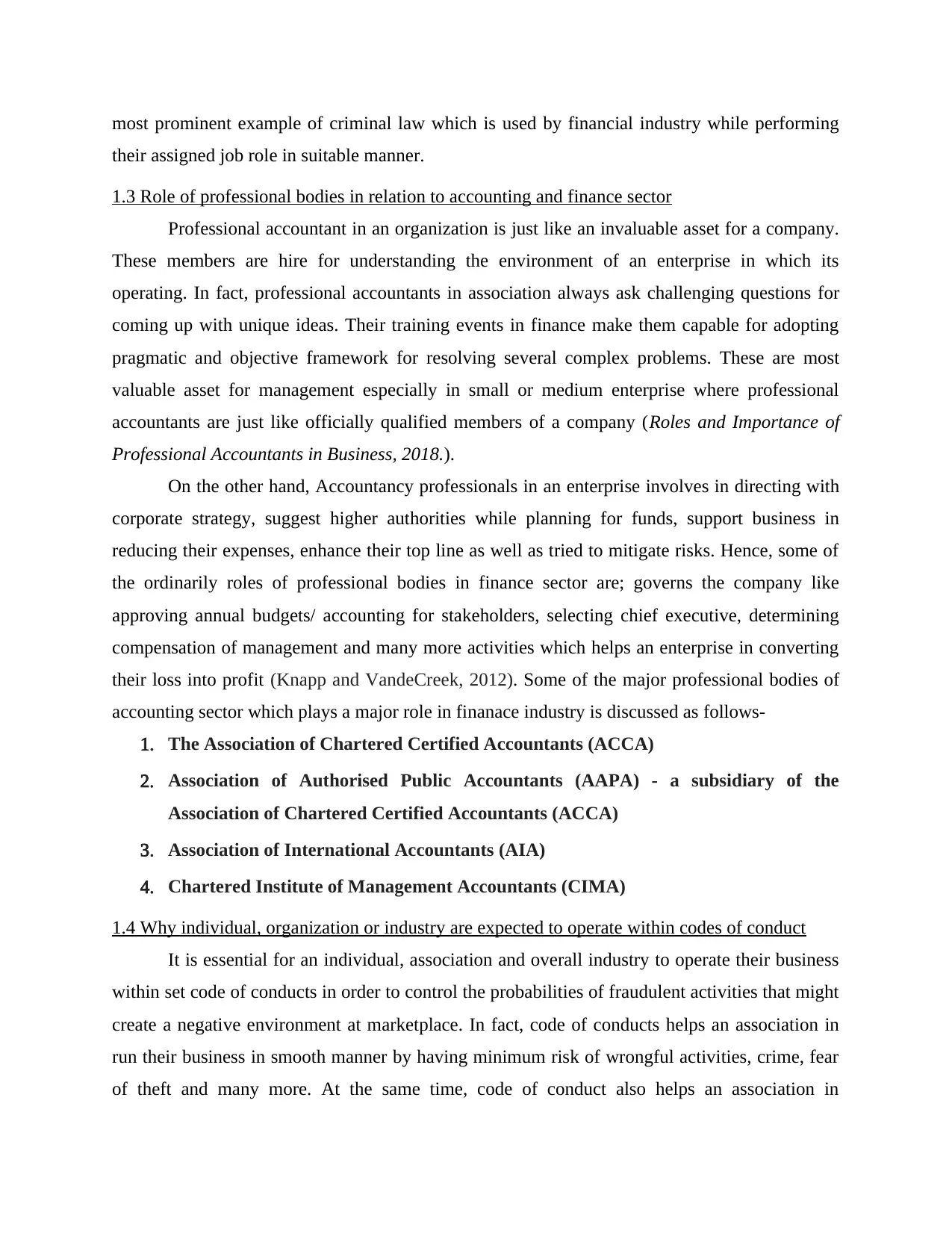
most prominent example of criminal law which is used by financial industry while performing
their assigned job role in suitable manner.
1.3 Role of professional bodies in relation to accounting and finance sector
Professional accountant in an organization is just like an invaluable asset for a company.
These members are hire for understanding the environment of an enterprise in which its
operating. In fact, professional accountants in association always ask challenging questions for
coming up with unique ideas. Their training events in finance make them capable for adopting
pragmatic and objective framework for resolving several complex problems. These are most
valuable asset for management especially in small or medium enterprise where professional
accountants are just like officially qualified members of a company (Roles and Importance of
Professional Accountants in Business, 2018.).
On the other hand, Accountancy professionals in an enterprise involves in directing with
corporate strategy, suggest higher authorities while planning for funds, support business in
reducing their expenses, enhance their top line as well as tried to mitigate risks. Hence, some of
the ordinarily roles of professional bodies in finance sector are; governs the company like
approving annual budgets/ accounting for stakeholders, selecting chief executive, determining
compensation of management and many more activities which helps an enterprise in converting
their loss into profit (Knapp and VandeCreek, 2012). Some of the major professional bodies of
accounting sector which plays a major role in finanace industry is discussed as follows-
1. The Association of Chartered Certified Accountants (ACCA)
2. Association of Authorised Public Accountants (AAPA) - a subsidiary of the
Association of Chartered Certified Accountants (ACCA)
3. Association of International Accountants (AIA)
4. Chartered Institute of Management Accountants (CIMA)
1.4 Why individual, organization or industry are expected to operate within codes of conduct
It is essential for an individual, association and overall industry to operate their business
within set code of conducts in order to control the probabilities of fraudulent activities that might
create a negative environment at marketplace. In fact, code of conducts helps an association in
run their business in smooth manner by having minimum risk of wrongful activities, crime, fear
of theft and many more. At the same time, code of conduct also helps an association in
their assigned job role in suitable manner.
1.3 Role of professional bodies in relation to accounting and finance sector
Professional accountant in an organization is just like an invaluable asset for a company.
These members are hire for understanding the environment of an enterprise in which its
operating. In fact, professional accountants in association always ask challenging questions for
coming up with unique ideas. Their training events in finance make them capable for adopting
pragmatic and objective framework for resolving several complex problems. These are most
valuable asset for management especially in small or medium enterprise where professional
accountants are just like officially qualified members of a company (Roles and Importance of
Professional Accountants in Business, 2018.).
On the other hand, Accountancy professionals in an enterprise involves in directing with
corporate strategy, suggest higher authorities while planning for funds, support business in
reducing their expenses, enhance their top line as well as tried to mitigate risks. Hence, some of
the ordinarily roles of professional bodies in finance sector are; governs the company like
approving annual budgets/ accounting for stakeholders, selecting chief executive, determining
compensation of management and many more activities which helps an enterprise in converting
their loss into profit (Knapp and VandeCreek, 2012). Some of the major professional bodies of
accounting sector which plays a major role in finanace industry is discussed as follows-
1. The Association of Chartered Certified Accountants (ACCA)
2. Association of Authorised Public Accountants (AAPA) - a subsidiary of the
Association of Chartered Certified Accountants (ACCA)
3. Association of International Accountants (AIA)
4. Chartered Institute of Management Accountants (CIMA)
1.4 Why individual, organization or industry are expected to operate within codes of conduct
It is essential for an individual, association and overall industry to operate their business
within set code of conducts in order to control the probabilities of fraudulent activities that might
create a negative environment at marketplace. In fact, code of conducts helps an association in
run their business in smooth manner by having minimum risk of wrongful activities, crime, fear
of theft and many more. At the same time, code of conduct also helps an association in
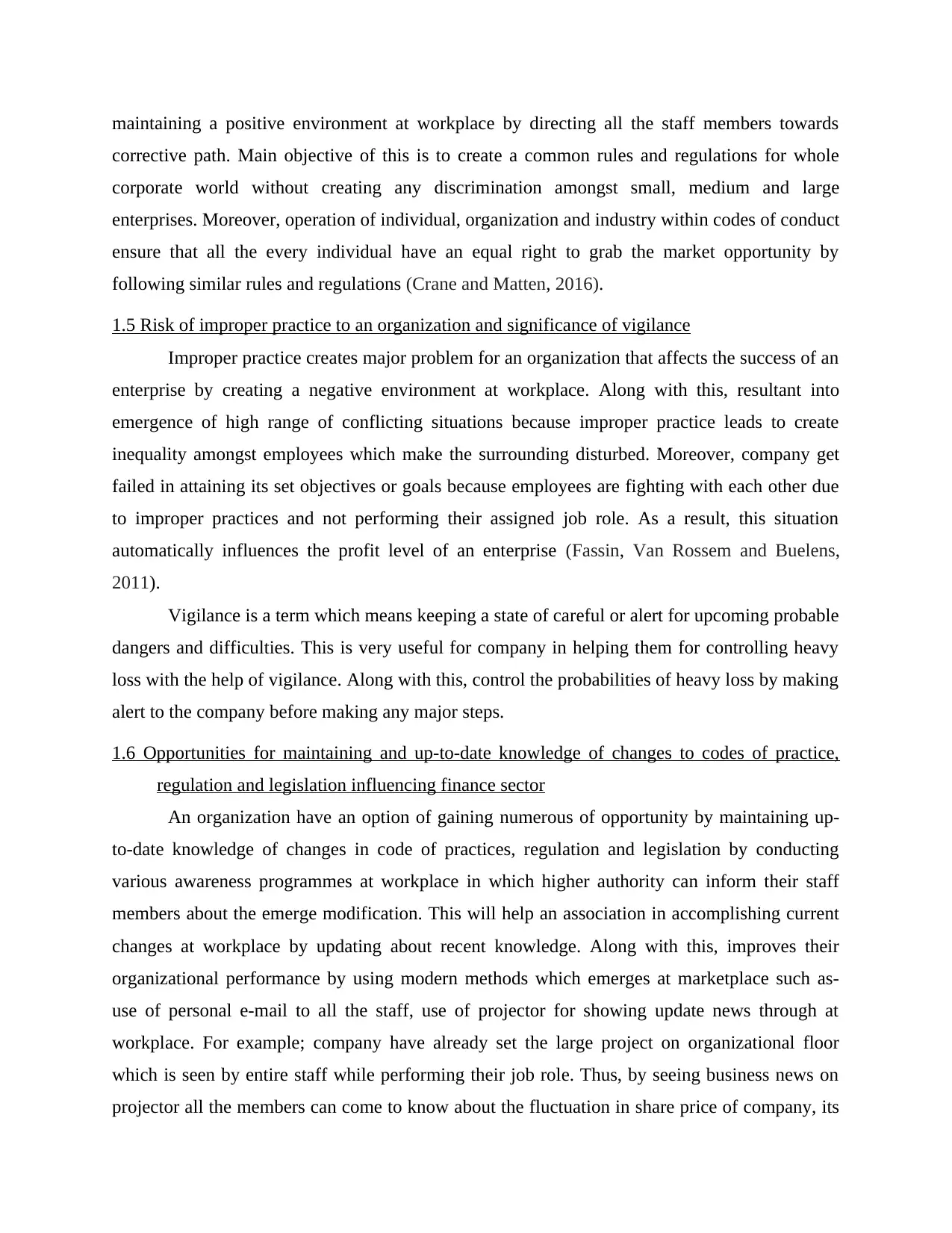
maintaining a positive environment at workplace by directing all the staff members towards
corrective path. Main objective of this is to create a common rules and regulations for whole
corporate world without creating any discrimination amongst small, medium and large
enterprises. Moreover, operation of individual, organization and industry within codes of conduct
ensure that all the every individual have an equal right to grab the market opportunity by
following similar rules and regulations (Crane and Matten, 2016).
1.5 Risk of improper practice to an organization and significance of vigilance
Improper practice creates major problem for an organization that affects the success of an
enterprise by creating a negative environment at workplace. Along with this, resultant into
emergence of high range of conflicting situations because improper practice leads to create
inequality amongst employees which make the surrounding disturbed. Moreover, company get
failed in attaining its set objectives or goals because employees are fighting with each other due
to improper practices and not performing their assigned job role. As a result, this situation
automatically influences the profit level of an enterprise (Fassin, Van Rossem and Buelens,
2011).
Vigilance is a term which means keeping a state of careful or alert for upcoming probable
dangers and difficulties. This is very useful for company in helping them for controlling heavy
loss with the help of vigilance. Along with this, control the probabilities of heavy loss by making
alert to the company before making any major steps.
1.6 Opportunities for maintaining and up-to-date knowledge of changes to codes of practice,
regulation and legislation influencing finance sector
An organization have an option of gaining numerous of opportunity by maintaining up-
to-date knowledge of changes in code of practices, regulation and legislation by conducting
various awareness programmes at workplace in which higher authority can inform their staff
members about the emerge modification. This will help an association in accomplishing current
changes at workplace by updating about recent knowledge. Along with this, improves their
organizational performance by using modern methods which emerges at marketplace such as-
use of personal e-mail to all the staff, use of projector for showing update news through at
workplace. For example; company have already set the large project on organizational floor
which is seen by entire staff while performing their job role. Thus, by seeing business news on
projector all the members can come to know about the fluctuation in share price of company, its
corrective path. Main objective of this is to create a common rules and regulations for whole
corporate world without creating any discrimination amongst small, medium and large
enterprises. Moreover, operation of individual, organization and industry within codes of conduct
ensure that all the every individual have an equal right to grab the market opportunity by
following similar rules and regulations (Crane and Matten, 2016).
1.5 Risk of improper practice to an organization and significance of vigilance
Improper practice creates major problem for an organization that affects the success of an
enterprise by creating a negative environment at workplace. Along with this, resultant into
emergence of high range of conflicting situations because improper practice leads to create
inequality amongst employees which make the surrounding disturbed. Moreover, company get
failed in attaining its set objectives or goals because employees are fighting with each other due
to improper practices and not performing their assigned job role. As a result, this situation
automatically influences the profit level of an enterprise (Fassin, Van Rossem and Buelens,
2011).
Vigilance is a term which means keeping a state of careful or alert for upcoming probable
dangers and difficulties. This is very useful for company in helping them for controlling heavy
loss with the help of vigilance. Along with this, control the probabilities of heavy loss by making
alert to the company before making any major steps.
1.6 Opportunities for maintaining and up-to-date knowledge of changes to codes of practice,
regulation and legislation influencing finance sector
An organization have an option of gaining numerous of opportunity by maintaining up-
to-date knowledge of changes in code of practices, regulation and legislation by conducting
various awareness programmes at workplace in which higher authority can inform their staff
members about the emerge modification. This will help an association in accomplishing current
changes at workplace by updating about recent knowledge. Along with this, improves their
organizational performance by using modern methods which emerges at marketplace such as-
use of personal e-mail to all the staff, use of projector for showing update news through at
workplace. For example; company have already set the large project on organizational floor
which is seen by entire staff while performing their job role. Thus, by seeing business news on
projector all the members can come to know about the fluctuation in share price of company, its
⊘ This is a preview!⊘
Do you want full access?
Subscribe today to unlock all pages.

Trusted by 1+ million students worldwide
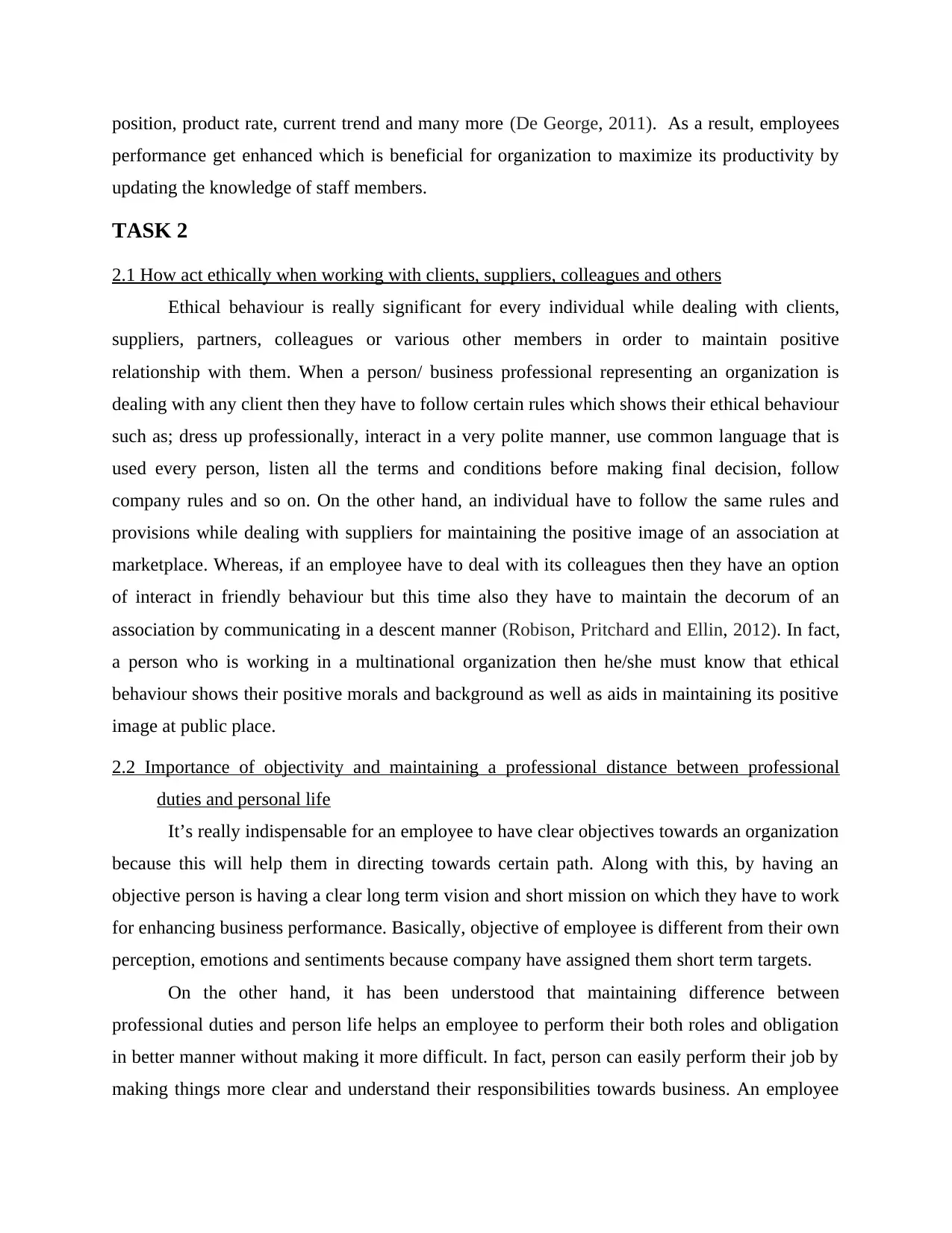
position, product rate, current trend and many more (De George, 2011). As a result, employees
performance get enhanced which is beneficial for organization to maximize its productivity by
updating the knowledge of staff members.
TASK 2
2.1 How act ethically when working with clients, suppliers, colleagues and others
Ethical behaviour is really significant for every individual while dealing with clients,
suppliers, partners, colleagues or various other members in order to maintain positive
relationship with them. When a person/ business professional representing an organization is
dealing with any client then they have to follow certain rules which shows their ethical behaviour
such as; dress up professionally, interact in a very polite manner, use common language that is
used every person, listen all the terms and conditions before making final decision, follow
company rules and so on. On the other hand, an individual have to follow the same rules and
provisions while dealing with suppliers for maintaining the positive image of an association at
marketplace. Whereas, if an employee have to deal with its colleagues then they have an option
of interact in friendly behaviour but this time also they have to maintain the decorum of an
association by communicating in a descent manner (Robison, Pritchard and Ellin, 2012). In fact,
a person who is working in a multinational organization then he/she must know that ethical
behaviour shows their positive morals and background as well as aids in maintaining its positive
image at public place.
2.2 Importance of objectivity and maintaining a professional distance between professional
duties and personal life
It’s really indispensable for an employee to have clear objectives towards an organization
because this will help them in directing towards certain path. Along with this, by having an
objective person is having a clear long term vision and short mission on which they have to work
for enhancing business performance. Basically, objective of employee is different from their own
perception, emotions and sentiments because company have assigned them short term targets.
On the other hand, it has been understood that maintaining difference between
professional duties and person life helps an employee to perform their both roles and obligation
in better manner without making it more difficult. In fact, person can easily perform their job by
making things more clear and understand their responsibilities towards business. An employee
performance get enhanced which is beneficial for organization to maximize its productivity by
updating the knowledge of staff members.
TASK 2
2.1 How act ethically when working with clients, suppliers, colleagues and others
Ethical behaviour is really significant for every individual while dealing with clients,
suppliers, partners, colleagues or various other members in order to maintain positive
relationship with them. When a person/ business professional representing an organization is
dealing with any client then they have to follow certain rules which shows their ethical behaviour
such as; dress up professionally, interact in a very polite manner, use common language that is
used every person, listen all the terms and conditions before making final decision, follow
company rules and so on. On the other hand, an individual have to follow the same rules and
provisions while dealing with suppliers for maintaining the positive image of an association at
marketplace. Whereas, if an employee have to deal with its colleagues then they have an option
of interact in friendly behaviour but this time also they have to maintain the decorum of an
association by communicating in a descent manner (Robison, Pritchard and Ellin, 2012). In fact,
a person who is working in a multinational organization then he/she must know that ethical
behaviour shows their positive morals and background as well as aids in maintaining its positive
image at public place.
2.2 Importance of objectivity and maintaining a professional distance between professional
duties and personal life
It’s really indispensable for an employee to have clear objectives towards an organization
because this will help them in directing towards certain path. Along with this, by having an
objective person is having a clear long term vision and short mission on which they have to work
for enhancing business performance. Basically, objective of employee is different from their own
perception, emotions and sentiments because company have assigned them short term targets.
On the other hand, it has been understood that maintaining difference between
professional duties and person life helps an employee to perform their both roles and obligation
in better manner without making it more difficult. In fact, person can easily perform their job by
making things more clear and understand their responsibilities towards business. An employee
Paraphrase This Document
Need a fresh take? Get an instant paraphrase of this document with our AI Paraphraser
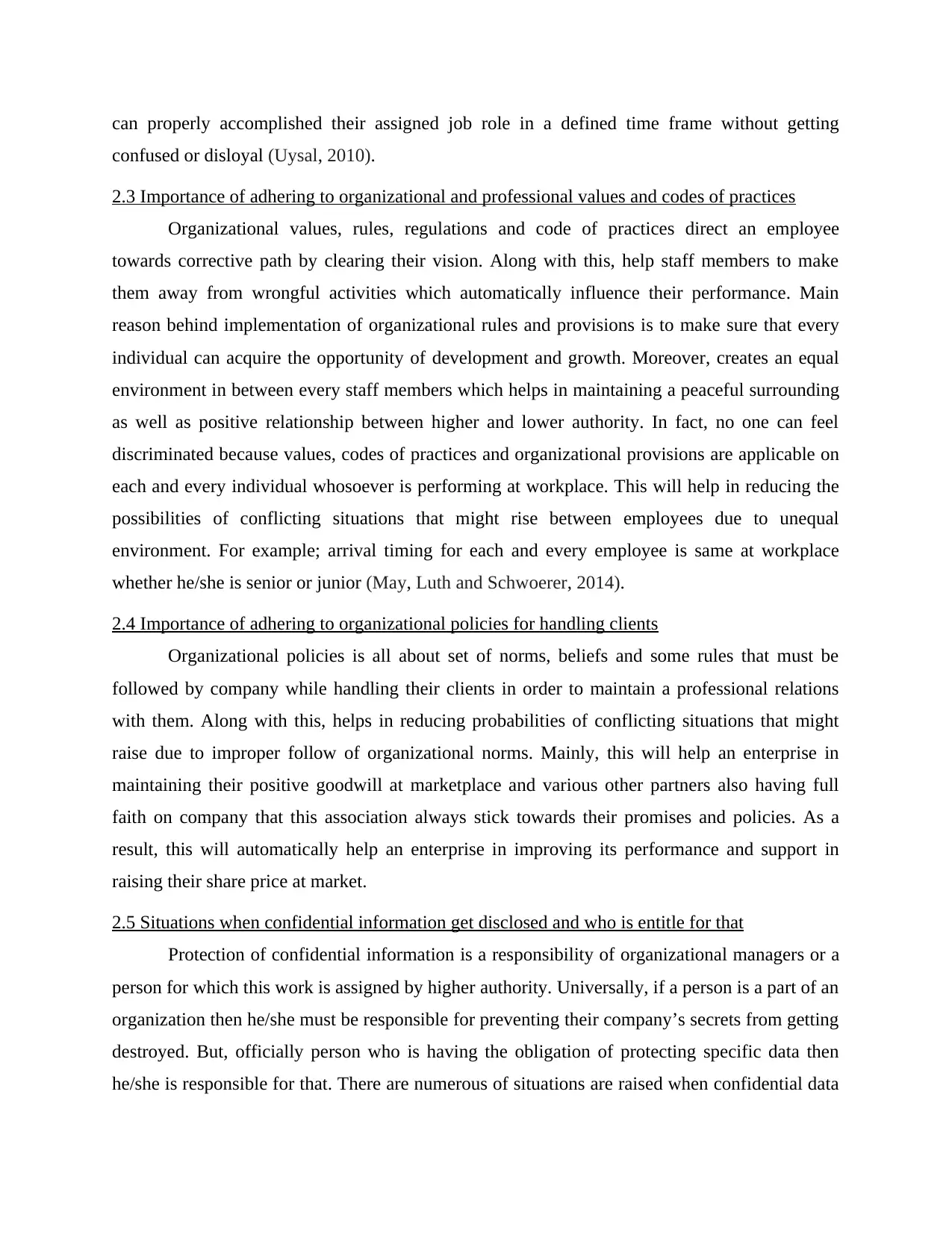
can properly accomplished their assigned job role in a defined time frame without getting
confused or disloyal (Uysal, 2010).
2.3 Importance of adhering to organizational and professional values and codes of practices
Organizational values, rules, regulations and code of practices direct an employee
towards corrective path by clearing their vision. Along with this, help staff members to make
them away from wrongful activities which automatically influence their performance. Main
reason behind implementation of organizational rules and provisions is to make sure that every
individual can acquire the opportunity of development and growth. Moreover, creates an equal
environment in between every staff members which helps in maintaining a peaceful surrounding
as well as positive relationship between higher and lower authority. In fact, no one can feel
discriminated because values, codes of practices and organizational provisions are applicable on
each and every individual whosoever is performing at workplace. This will help in reducing the
possibilities of conflicting situations that might rise between employees due to unequal
environment. For example; arrival timing for each and every employee is same at workplace
whether he/she is senior or junior (May, Luth and Schwoerer, 2014).
2.4 Importance of adhering to organizational policies for handling clients
Organizational policies is all about set of norms, beliefs and some rules that must be
followed by company while handling their clients in order to maintain a professional relations
with them. Along with this, helps in reducing probabilities of conflicting situations that might
raise due to improper follow of organizational norms. Mainly, this will help an enterprise in
maintaining their positive goodwill at marketplace and various other partners also having full
faith on company that this association always stick towards their promises and policies. As a
result, this will automatically help an enterprise in improving its performance and support in
raising their share price at market.
2.5 Situations when confidential information get disclosed and who is entitle for that
Protection of confidential information is a responsibility of organizational managers or a
person for which this work is assigned by higher authority. Universally, if a person is a part of an
organization then he/she must be responsible for preventing their company’s secrets from getting
destroyed. But, officially person who is having the obligation of protecting specific data then
he/she is responsible for that. There are numerous of situations are raised when confidential data
confused or disloyal (Uysal, 2010).
2.3 Importance of adhering to organizational and professional values and codes of practices
Organizational values, rules, regulations and code of practices direct an employee
towards corrective path by clearing their vision. Along with this, help staff members to make
them away from wrongful activities which automatically influence their performance. Main
reason behind implementation of organizational rules and provisions is to make sure that every
individual can acquire the opportunity of development and growth. Moreover, creates an equal
environment in between every staff members which helps in maintaining a peaceful surrounding
as well as positive relationship between higher and lower authority. In fact, no one can feel
discriminated because values, codes of practices and organizational provisions are applicable on
each and every individual whosoever is performing at workplace. This will help in reducing the
possibilities of conflicting situations that might rise between employees due to unequal
environment. For example; arrival timing for each and every employee is same at workplace
whether he/she is senior or junior (May, Luth and Schwoerer, 2014).
2.4 Importance of adhering to organizational policies for handling clients
Organizational policies is all about set of norms, beliefs and some rules that must be
followed by company while handling their clients in order to maintain a professional relations
with them. Along with this, helps in reducing probabilities of conflicting situations that might
raise due to improper follow of organizational norms. Mainly, this will help an enterprise in
maintaining their positive goodwill at marketplace and various other partners also having full
faith on company that this association always stick towards their promises and policies. As a
result, this will automatically help an enterprise in improving its performance and support in
raising their share price at market.
2.5 Situations when confidential information get disclosed and who is entitle for that
Protection of confidential information is a responsibility of organizational managers or a
person for which this work is assigned by higher authority. Universally, if a person is a part of an
organization then he/she must be responsible for preventing their company’s secrets from getting
destroyed. But, officially person who is having the obligation of protecting specific data then
he/she is responsible for that. There are numerous of situations are raised when confidential data
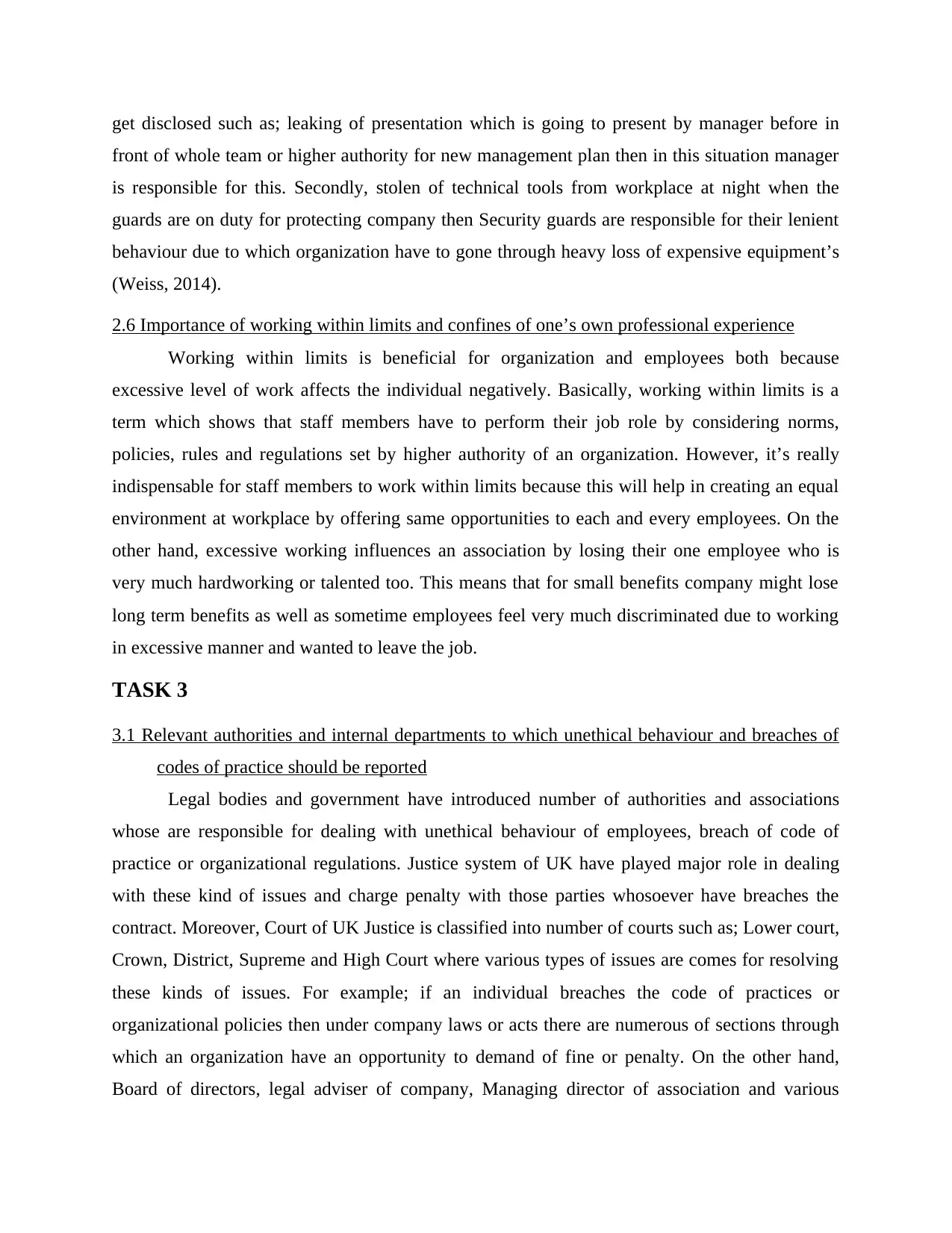
get disclosed such as; leaking of presentation which is going to present by manager before in
front of whole team or higher authority for new management plan then in this situation manager
is responsible for this. Secondly, stolen of technical tools from workplace at night when the
guards are on duty for protecting company then Security guards are responsible for their lenient
behaviour due to which organization have to gone through heavy loss of expensive equipment’s
(Weiss, 2014).
2.6 Importance of working within limits and confines of one’s own professional experience
Working within limits is beneficial for organization and employees both because
excessive level of work affects the individual negatively. Basically, working within limits is a
term which shows that staff members have to perform their job role by considering norms,
policies, rules and regulations set by higher authority of an organization. However, it’s really
indispensable for staff members to work within limits because this will help in creating an equal
environment at workplace by offering same opportunities to each and every employees. On the
other hand, excessive working influences an association by losing their one employee who is
very much hardworking or talented too. This means that for small benefits company might lose
long term benefits as well as sometime employees feel very much discriminated due to working
in excessive manner and wanted to leave the job.
TASK 3
3.1 Relevant authorities and internal departments to which unethical behaviour and breaches of
codes of practice should be reported
Legal bodies and government have introduced number of authorities and associations
whose are responsible for dealing with unethical behaviour of employees, breach of code of
practice or organizational regulations. Justice system of UK have played major role in dealing
with these kind of issues and charge penalty with those parties whosoever have breaches the
contract. Moreover, Court of UK Justice is classified into number of courts such as; Lower court,
Crown, District, Supreme and High Court where various types of issues are comes for resolving
these kinds of issues. For example; if an individual breaches the code of practices or
organizational policies then under company laws or acts there are numerous of sections through
which an organization have an opportunity to demand of fine or penalty. On the other hand,
Board of directors, legal adviser of company, Managing director of association and various
front of whole team or higher authority for new management plan then in this situation manager
is responsible for this. Secondly, stolen of technical tools from workplace at night when the
guards are on duty for protecting company then Security guards are responsible for their lenient
behaviour due to which organization have to gone through heavy loss of expensive equipment’s
(Weiss, 2014).
2.6 Importance of working within limits and confines of one’s own professional experience
Working within limits is beneficial for organization and employees both because
excessive level of work affects the individual negatively. Basically, working within limits is a
term which shows that staff members have to perform their job role by considering norms,
policies, rules and regulations set by higher authority of an organization. However, it’s really
indispensable for staff members to work within limits because this will help in creating an equal
environment at workplace by offering same opportunities to each and every employees. On the
other hand, excessive working influences an association by losing their one employee who is
very much hardworking or talented too. This means that for small benefits company might lose
long term benefits as well as sometime employees feel very much discriminated due to working
in excessive manner and wanted to leave the job.
TASK 3
3.1 Relevant authorities and internal departments to which unethical behaviour and breaches of
codes of practice should be reported
Legal bodies and government have introduced number of authorities and associations
whose are responsible for dealing with unethical behaviour of employees, breach of code of
practice or organizational regulations. Justice system of UK have played major role in dealing
with these kind of issues and charge penalty with those parties whosoever have breaches the
contract. Moreover, Court of UK Justice is classified into number of courts such as; Lower court,
Crown, District, Supreme and High Court where various types of issues are comes for resolving
these kinds of issues. For example; if an individual breaches the code of practices or
organizational policies then under company laws or acts there are numerous of sections through
which an organization have an opportunity to demand of fine or penalty. On the other hand,
Board of directors, legal adviser of company, Managing director of association and various
⊘ This is a preview!⊘
Do you want full access?
Subscribe today to unlock all pages.

Trusted by 1+ million students worldwide
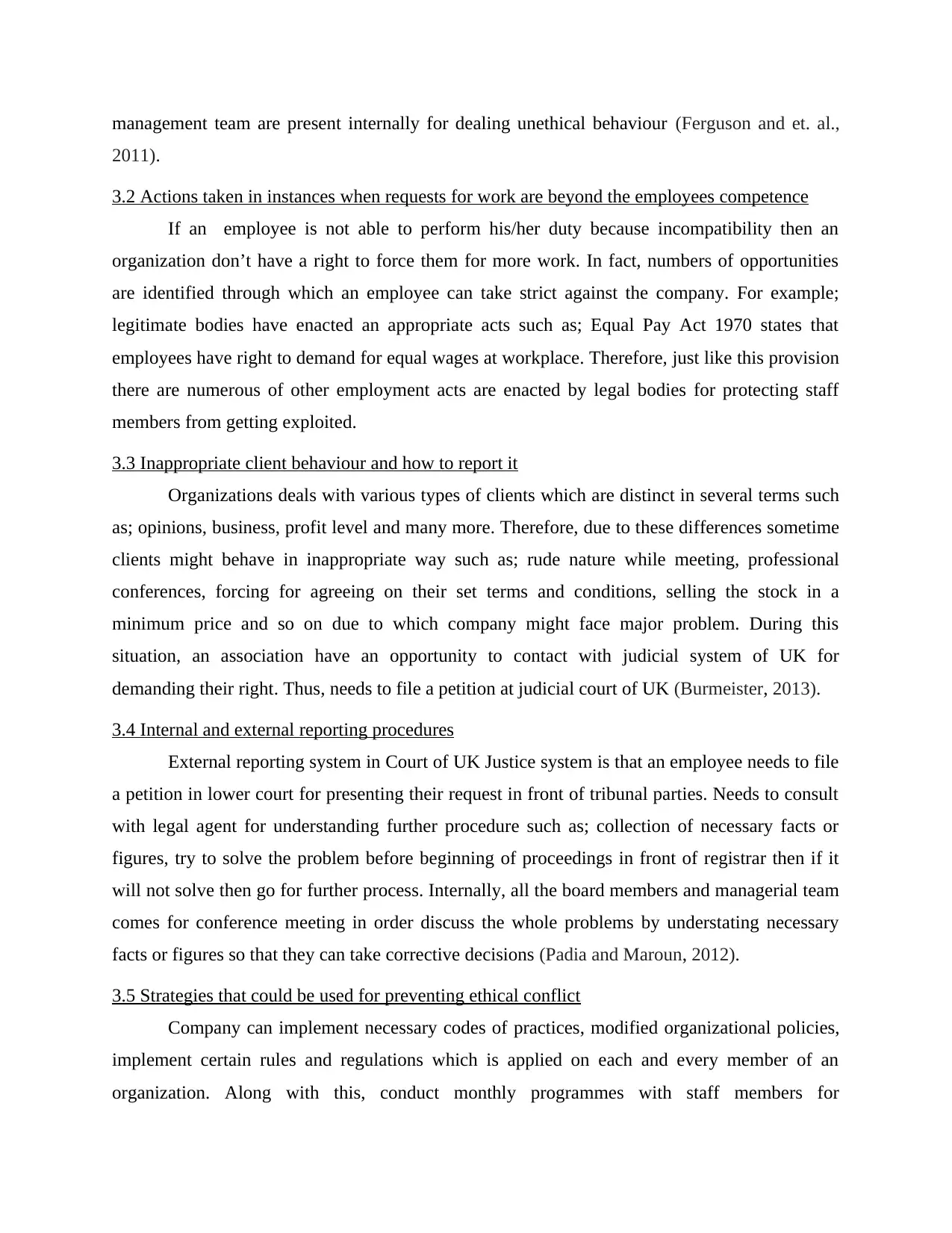
management team are present internally for dealing unethical behaviour (Ferguson and et. al.,
2011).
3.2 Actions taken in instances when requests for work are beyond the employees competence
If an employee is not able to perform his/her duty because incompatibility then an
organization don’t have a right to force them for more work. In fact, numbers of opportunities
are identified through which an employee can take strict against the company. For example;
legitimate bodies have enacted an appropriate acts such as; Equal Pay Act 1970 states that
employees have right to demand for equal wages at workplace. Therefore, just like this provision
there are numerous of other employment acts are enacted by legal bodies for protecting staff
members from getting exploited.
3.3 Inappropriate client behaviour and how to report it
Organizations deals with various types of clients which are distinct in several terms such
as; opinions, business, profit level and many more. Therefore, due to these differences sometime
clients might behave in inappropriate way such as; rude nature while meeting, professional
conferences, forcing for agreeing on their set terms and conditions, selling the stock in a
minimum price and so on due to which company might face major problem. During this
situation, an association have an opportunity to contact with judicial system of UK for
demanding their right. Thus, needs to file a petition at judicial court of UK (Burmeister, 2013).
3.4 Internal and external reporting procedures
External reporting system in Court of UK Justice system is that an employee needs to file
a petition in lower court for presenting their request in front of tribunal parties. Needs to consult
with legal agent for understanding further procedure such as; collection of necessary facts or
figures, try to solve the problem before beginning of proceedings in front of registrar then if it
will not solve then go for further process. Internally, all the board members and managerial team
comes for conference meeting in order discuss the whole problems by understating necessary
facts or figures so that they can take corrective decisions (Padia and Maroun, 2012).
3.5 Strategies that could be used for preventing ethical conflict
Company can implement necessary codes of practices, modified organizational policies,
implement certain rules and regulations which is applied on each and every member of an
organization. Along with this, conduct monthly programmes with staff members for
2011).
3.2 Actions taken in instances when requests for work are beyond the employees competence
If an employee is not able to perform his/her duty because incompatibility then an
organization don’t have a right to force them for more work. In fact, numbers of opportunities
are identified through which an employee can take strict against the company. For example;
legitimate bodies have enacted an appropriate acts such as; Equal Pay Act 1970 states that
employees have right to demand for equal wages at workplace. Therefore, just like this provision
there are numerous of other employment acts are enacted by legal bodies for protecting staff
members from getting exploited.
3.3 Inappropriate client behaviour and how to report it
Organizations deals with various types of clients which are distinct in several terms such
as; opinions, business, profit level and many more. Therefore, due to these differences sometime
clients might behave in inappropriate way such as; rude nature while meeting, professional
conferences, forcing for agreeing on their set terms and conditions, selling the stock in a
minimum price and so on due to which company might face major problem. During this
situation, an association have an opportunity to contact with judicial system of UK for
demanding their right. Thus, needs to file a petition at judicial court of UK (Burmeister, 2013).
3.4 Internal and external reporting procedures
External reporting system in Court of UK Justice system is that an employee needs to file
a petition in lower court for presenting their request in front of tribunal parties. Needs to consult
with legal agent for understanding further procedure such as; collection of necessary facts or
figures, try to solve the problem before beginning of proceedings in front of registrar then if it
will not solve then go for further process. Internally, all the board members and managerial team
comes for conference meeting in order discuss the whole problems by understating necessary
facts or figures so that they can take corrective decisions (Padia and Maroun, 2012).
3.5 Strategies that could be used for preventing ethical conflict
Company can implement necessary codes of practices, modified organizational policies,
implement certain rules and regulations which is applied on each and every member of an
organization. Along with this, conduct monthly programmes with staff members for
Paraphrase This Document
Need a fresh take? Get an instant paraphrase of this document with our AI Paraphraser
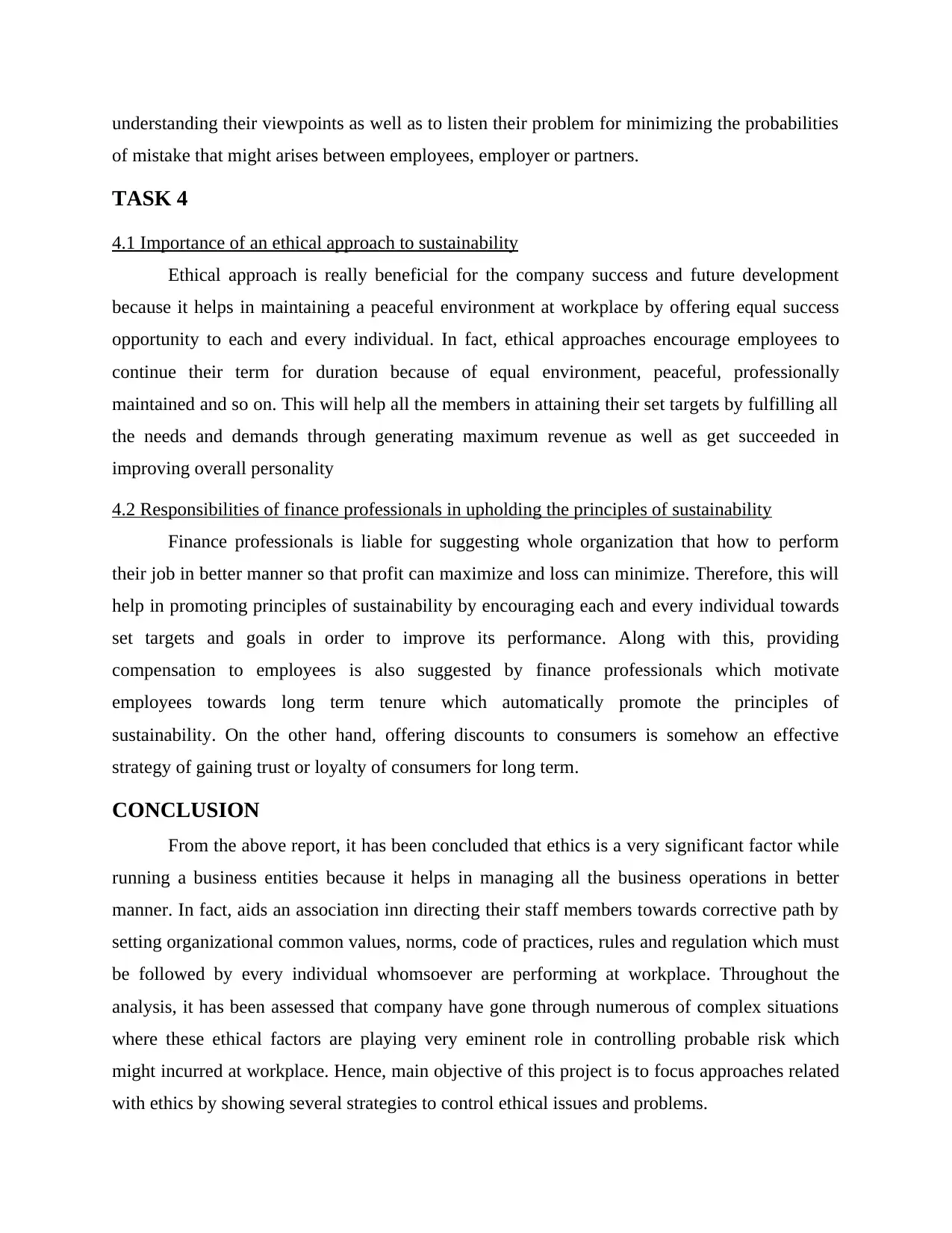
understanding their viewpoints as well as to listen their problem for minimizing the probabilities
of mistake that might arises between employees, employer or partners.
TASK 4
4.1 Importance of an ethical approach to sustainability
Ethical approach is really beneficial for the company success and future development
because it helps in maintaining a peaceful environment at workplace by offering equal success
opportunity to each and every individual. In fact, ethical approaches encourage employees to
continue their term for duration because of equal environment, peaceful, professionally
maintained and so on. This will help all the members in attaining their set targets by fulfilling all
the needs and demands through generating maximum revenue as well as get succeeded in
improving overall personality
4.2 Responsibilities of finance professionals in upholding the principles of sustainability
Finance professionals is liable for suggesting whole organization that how to perform
their job in better manner so that profit can maximize and loss can minimize. Therefore, this will
help in promoting principles of sustainability by encouraging each and every individual towards
set targets and goals in order to improve its performance. Along with this, providing
compensation to employees is also suggested by finance professionals which motivate
employees towards long term tenure which automatically promote the principles of
sustainability. On the other hand, offering discounts to consumers is somehow an effective
strategy of gaining trust or loyalty of consumers for long term.
CONCLUSION
From the above report, it has been concluded that ethics is a very significant factor while
running a business entities because it helps in managing all the business operations in better
manner. In fact, aids an association inn directing their staff members towards corrective path by
setting organizational common values, norms, code of practices, rules and regulation which must
be followed by every individual whomsoever are performing at workplace. Throughout the
analysis, it has been assessed that company have gone through numerous of complex situations
where these ethical factors are playing very eminent role in controlling probable risk which
might incurred at workplace. Hence, main objective of this project is to focus approaches related
with ethics by showing several strategies to control ethical issues and problems.
of mistake that might arises between employees, employer or partners.
TASK 4
4.1 Importance of an ethical approach to sustainability
Ethical approach is really beneficial for the company success and future development
because it helps in maintaining a peaceful environment at workplace by offering equal success
opportunity to each and every individual. In fact, ethical approaches encourage employees to
continue their term for duration because of equal environment, peaceful, professionally
maintained and so on. This will help all the members in attaining their set targets by fulfilling all
the needs and demands through generating maximum revenue as well as get succeeded in
improving overall personality
4.2 Responsibilities of finance professionals in upholding the principles of sustainability
Finance professionals is liable for suggesting whole organization that how to perform
their job in better manner so that profit can maximize and loss can minimize. Therefore, this will
help in promoting principles of sustainability by encouraging each and every individual towards
set targets and goals in order to improve its performance. Along with this, providing
compensation to employees is also suggested by finance professionals which motivate
employees towards long term tenure which automatically promote the principles of
sustainability. On the other hand, offering discounts to consumers is somehow an effective
strategy of gaining trust or loyalty of consumers for long term.
CONCLUSION
From the above report, it has been concluded that ethics is a very significant factor while
running a business entities because it helps in managing all the business operations in better
manner. In fact, aids an association inn directing their staff members towards corrective path by
setting organizational common values, norms, code of practices, rules and regulation which must
be followed by every individual whomsoever are performing at workplace. Throughout the
analysis, it has been assessed that company have gone through numerous of complex situations
where these ethical factors are playing very eminent role in controlling probable risk which
might incurred at workplace. Hence, main objective of this project is to focus approaches related
with ethics by showing several strategies to control ethical issues and problems.
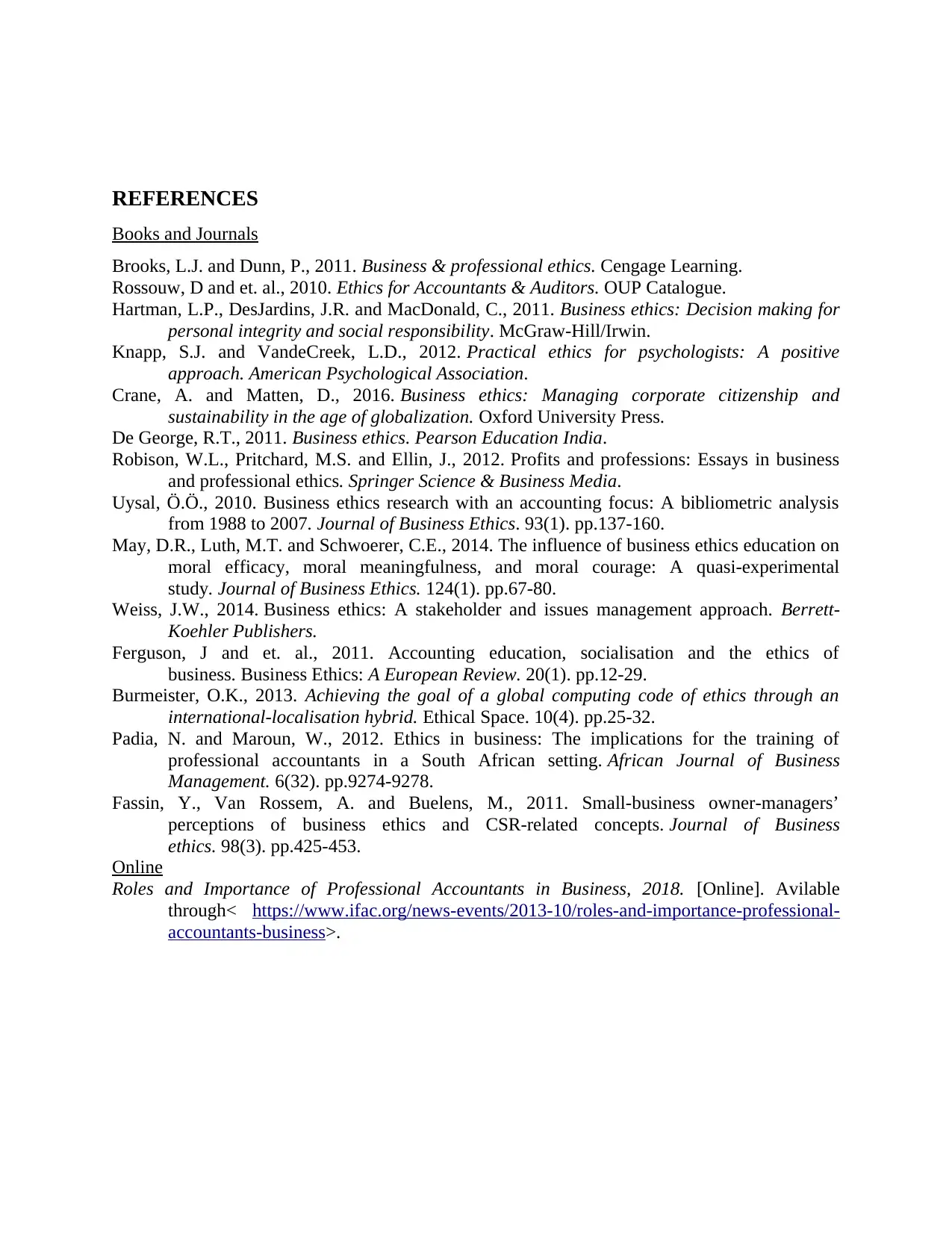
REFERENCES
Books and Journals
Brooks, L.J. and Dunn, P., 2011. Business & professional ethics. Cengage Learning.
Rossouw, D and et. al., 2010. Ethics for Accountants & Auditors. OUP Catalogue.
Hartman, L.P., DesJardins, J.R. and MacDonald, C., 2011. Business ethics: Decision making for
personal integrity and social responsibility. McGraw-Hill/Irwin.
Knapp, S.J. and VandeCreek, L.D., 2012. Practical ethics for psychologists: A positive
approach. American Psychological Association.
Crane, A. and Matten, D., 2016. Business ethics: Managing corporate citizenship and
sustainability in the age of globalization. Oxford University Press.
De George, R.T., 2011. Business ethics. Pearson Education India.
Robison, W.L., Pritchard, M.S. and Ellin, J., 2012. Profits and professions: Essays in business
and professional ethics. Springer Science & Business Media.
Uysal, Ö.Ö., 2010. Business ethics research with an accounting focus: A bibliometric analysis
from 1988 to 2007. Journal of Business Ethics. 93(1). pp.137-160.
May, D.R., Luth, M.T. and Schwoerer, C.E., 2014. The influence of business ethics education on
moral efficacy, moral meaningfulness, and moral courage: A quasi-experimental
study. Journal of Business Ethics. 124(1). pp.67-80.
Weiss, J.W., 2014. Business ethics: A stakeholder and issues management approach. Berrett-
Koehler Publishers.
Ferguson, J and et. al., 2011. Accounting education, socialisation and the ethics of
business. Business Ethics: A European Review. 20(1). pp.12-29.
Burmeister, O.K., 2013. Achieving the goal of a global computing code of ethics through an
international-localisation hybrid. Ethical Space. 10(4). pp.25-32.
Padia, N. and Maroun, W., 2012. Ethics in business: The implications for the training of
professional accountants in a South African setting. African Journal of Business
Management. 6(32). pp.9274-9278.
Fassin, Y., Van Rossem, A. and Buelens, M., 2011. Small-business owner-managers’
perceptions of business ethics and CSR-related concepts. Journal of Business
ethics. 98(3). pp.425-453.
Online
Roles and Importance of Professional Accountants in Business, 2018. [Online]. Avilable
through< https://www.ifac.org/news-events/2013-10/roles-and-importance-professional-
accountants-business>.
Books and Journals
Brooks, L.J. and Dunn, P., 2011. Business & professional ethics. Cengage Learning.
Rossouw, D and et. al., 2010. Ethics for Accountants & Auditors. OUP Catalogue.
Hartman, L.P., DesJardins, J.R. and MacDonald, C., 2011. Business ethics: Decision making for
personal integrity and social responsibility. McGraw-Hill/Irwin.
Knapp, S.J. and VandeCreek, L.D., 2012. Practical ethics for psychologists: A positive
approach. American Psychological Association.
Crane, A. and Matten, D., 2016. Business ethics: Managing corporate citizenship and
sustainability in the age of globalization. Oxford University Press.
De George, R.T., 2011. Business ethics. Pearson Education India.
Robison, W.L., Pritchard, M.S. and Ellin, J., 2012. Profits and professions: Essays in business
and professional ethics. Springer Science & Business Media.
Uysal, Ö.Ö., 2010. Business ethics research with an accounting focus: A bibliometric analysis
from 1988 to 2007. Journal of Business Ethics. 93(1). pp.137-160.
May, D.R., Luth, M.T. and Schwoerer, C.E., 2014. The influence of business ethics education on
moral efficacy, moral meaningfulness, and moral courage: A quasi-experimental
study. Journal of Business Ethics. 124(1). pp.67-80.
Weiss, J.W., 2014. Business ethics: A stakeholder and issues management approach. Berrett-
Koehler Publishers.
Ferguson, J and et. al., 2011. Accounting education, socialisation and the ethics of
business. Business Ethics: A European Review. 20(1). pp.12-29.
Burmeister, O.K., 2013. Achieving the goal of a global computing code of ethics through an
international-localisation hybrid. Ethical Space. 10(4). pp.25-32.
Padia, N. and Maroun, W., 2012. Ethics in business: The implications for the training of
professional accountants in a South African setting. African Journal of Business
Management. 6(32). pp.9274-9278.
Fassin, Y., Van Rossem, A. and Buelens, M., 2011. Small-business owner-managers’
perceptions of business ethics and CSR-related concepts. Journal of Business
ethics. 98(3). pp.425-453.
Online
Roles and Importance of Professional Accountants in Business, 2018. [Online]. Avilable
through< https://www.ifac.org/news-events/2013-10/roles-and-importance-professional-
accountants-business>.
⊘ This is a preview!⊘
Do you want full access?
Subscribe today to unlock all pages.

Trusted by 1+ million students worldwide
1 out of 14
Related Documents
Your All-in-One AI-Powered Toolkit for Academic Success.
+13062052269
info@desklib.com
Available 24*7 on WhatsApp / Email
![[object Object]](/_next/static/media/star-bottom.7253800d.svg)
Unlock your academic potential
Copyright © 2020–2026 A2Z Services. All Rights Reserved. Developed and managed by ZUCOL.





